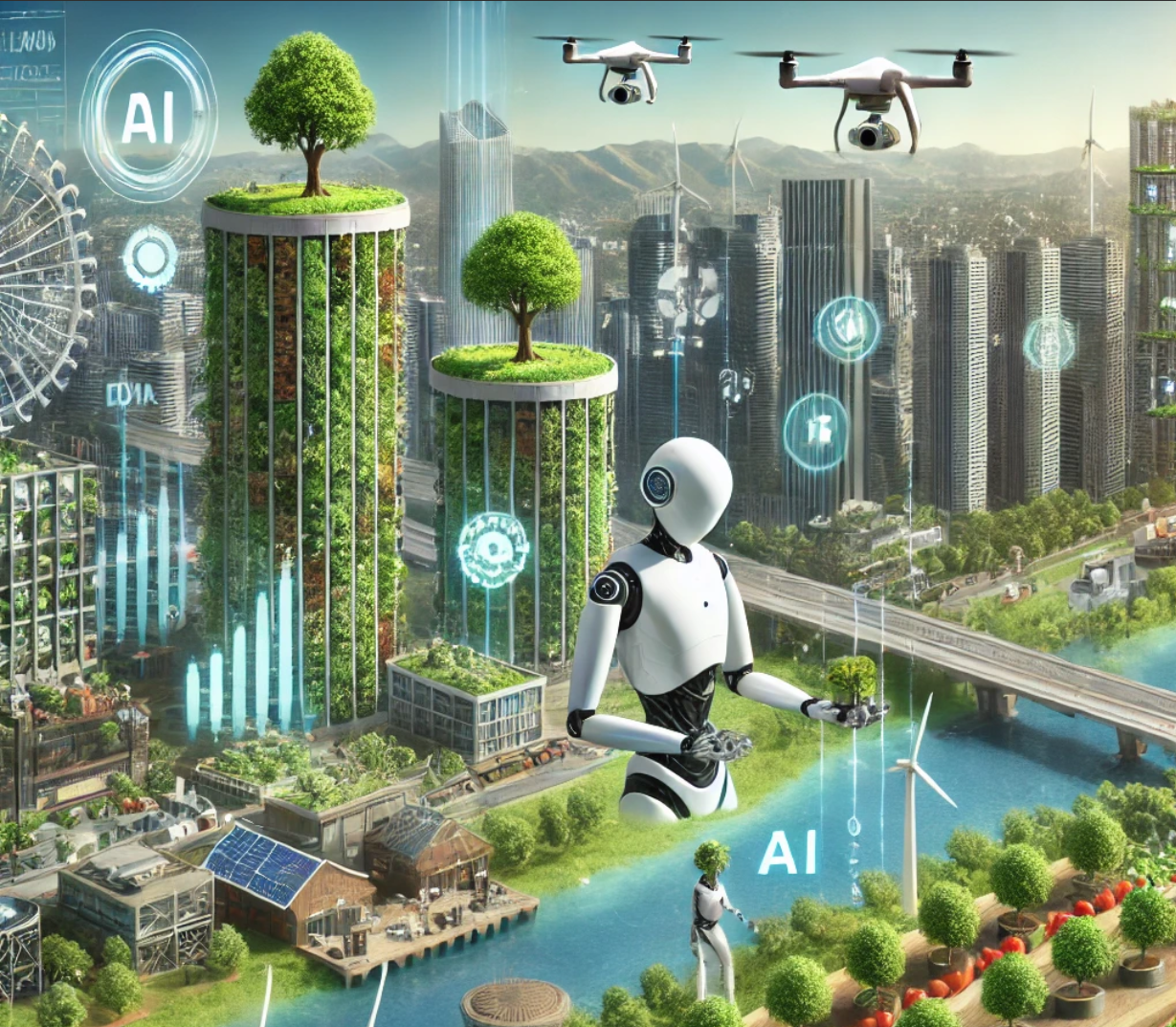Have you noticed a growing consciousness about emerging environmental issues? Indeed, people’s views have shifted dramatically, with many now preferring more environmentally friendly goods, including food, home appliances, and more. So, manufacturing companies are not lagging behind; they actually respond to their customers’ preferences with sustainable practices in their business operations.
It’s all good until we discuss large-scale sustainability, which demands fresh ideas and cutting-edge technologies. Artificial intelligence is a driving force that can save the day in the sustainability field. Today, you’ll find out how artificial neural networks can help businesses become more responsible.
Corporate Sustainability and Its Importance Today
You can say a company is sustainable when it sticks to a business approach that balances financial efficiency, social responsibility, and awareness of nature. Companies that make socially responsible and eco-friendly policies central to their growth strategies often generate lasting economic value. Sustainable practices involve the following steps:
- Lowering carbon emissions, managing resources responsibly, minimizing waste, and protecting biodiversity;
- Sticking to fair labor standards, support for local communities, diversity and inclusion, and employee well-being;
- Guaranteeing long-term financial stability, cost savings, risk management, and innovation in sustainable goods;
- Governing transparency, accountability, ethical corporate practices, and stakeholder participation.
Corporate sustainability is now a necessity, considering our current ecological situation. This is manifested in harsh climate fluctuations, resource scarcity, and inequality. Therefore, we need environmentally conscious manufacturing now more than ever.
As the pressure to cut emissions, consumption, and environmental effects intensifies, corporations are reconsidering everything. Driven by rising stakeholder and environmentally concerned customer demands, they seek ways to rethink business operations to promote sustainability. However, things do not always go smoothly, so businesses have a hard time making this transition.
One of the most effective methods for achieving these goals is through generative AI implementation, which allows businesses to optimize their processes, reduce waste, and create more efficient, environmentally friendly operations.
The route to net-zero emissions begins with a corporation measuring, controlling, and reporting on its carbon footprint. This includes keeping an eye on energy targets and ESG (Environmental, Social, and Governance) information. Furthermore, cost is often a big hurdle as businesses must make a hefty upfront investment.
Another challenge is scalability, and smaller companies might find it tough to fit sustainable practices into their everyday operations. On top of that, the complexity of global supply chains makes it harder to track and ensure responsible corporate operations, from production to distribution.
In addition to sustainability challenges, companies must also ensure the security of their sensitive data as they scale operations. A self hosted password manager provides an effective solution by allowing businesses to maintain control over their data and enhance security while avoiding reliance on external services.
To truly make a positive impact on the planet and bring people high-quality products, companies need the right combination of partnerships and AI-powered technology. This approach will help them maintain financial health and successfully achieve their goals.
How Artificial Intelligence Optimizes Sustainability Practices in Corporate Operations

AI is truly amazing, and it can boost business growth and success in countless ways. What’s even more exciting is how businesses can use AI to step up their sustainability game. In fact, a September 2023 IBM study found that 37% of business leaders already use AI for improved sustainability, with another 40% planning to adopt it soon. Let’s look at a few ways AI can help businesses go green.
Significant Reduction of Energy Consumption
Artificial intelligence is a central driving force for cutting down energy use. While upgrading outdated systems naturally improves quality and efficiency, AI goes even further. Machine learning algorithms gather and track energy data in places like factories and office buildings.
AI systems can use large amounts of data from IoT sensors to manage and improve energy use. This lets them constantly adjust heating, ventilation, and air conditioning systems. AI helps reduce energy usage during peak times.
Preventative Opportunities
AI’s predictive maintenance capabilities help avoid major issues by spotting problems early. By analyzing performance data from machines and equipment, AI can predict when something might need fixing before it breaks down. This keeps everything running smoothly and saves energy. For instance, AI can help HVAC systems run more efficiently by using data-driven insights to fix only what’s necessary.
Smarter Waste Management and Recycling
Using artificial intelligence in business operations can help handle waste smarter. AI-driven analytics can sort through trash and recycling streams, identifying reusable or recyclable materials. Thus, companies benefit from reducing waste and efficient recycling.
With AI-powered robots, materials like plastic and metal can be sorted faster than manual work. Moreover, human reliability is minimized, making the whole process more accurate.
Making the Most Out of Renewable Energy
Businesses can easily switch to renewable energy sources like solar and wind. With smart grids, companies have the ability to balance energy supply and demand and ensure the rational use of renewable energy.
What is more, AI-based forecasting can predict energy production based on weather conditions and adjust energy use accordingly. Businesses store excess clean energy for later use. So, this feature reduces reliance on fossil fuels and minimizes their carbon footprint.
Tackling Food Waste with Computer Vision
Waste occurs at every stage of the value chain, and global food waste is estimated at 20%. By leveraging AI, businesses have become more intelligent in two key ways:
- First, they can now forecast demand with greater accuracy, which helps them refine planning and production processes.
- Second, AI enables them to detect and analyze food waste data, allowing for smarter and more informed decision-making.
For instance, AI-powered computer vision is highly effective in handling food waste. By monitoring produce freshness in real time, this technology helps companies manage stock, ensuring near-expiry food is used before spoiling.
Cutting Down on Chemicals in Agriculture
In the agriculture industry, AI can enable farmers to minimize the need for excessive chemical application. Thanks to computer vision and precision farming techniques, AI pinpoints the exact areas where pesticides or fertilizers are truly necessary. This smart approach ensures chemicals aren’t applied haphazardly but on schedule.
AI’s Impact on Corporate Social Responsibility
When discussing the corporate world, AI comes in handy for businesses looking to elevate their social sustainability efforts. This way, companies can make meaningful strides in significant areas that impact employee satisfaction and productivity:
- Champion diversity and inclusion by reducing bias in hiring;
- Enhance employee well-being with tools that can keep an eye on employee health and stress;
- Promote volunteering initiatives by matching each staff member with fitting activities;
- Invest in employee growth and training by creating personalized learning paths;
- Uphold fair labor and wages by monitoring work hours and pay to guarantee everything’s adequately compensated.
By enhancing employee development through tailored training programs supported by learning management system software development services, companies can effectively promote sustainability and improve their corporate social responsibility initiatives. With AI, businesses can turn these values into actionable, impactful practices that go beyond just checking boxes.
Successful Case Studies of Implementing AI in Sustainable Business
Thanks to its beneficial impact on ensuring sustainability, artificial intelligence has attracted many organizations, including tycoons, in the market. Here are some examples of the world’s biggest companies using AI to address resource-efficient issues, highlighting its crucial role in creating a greener future.
Take a look at Tesla. It’s unbelievably amazing how their AI-driven self-driving cars are revolutionizing travel. But what’s more impressive is their approach to sustainability. The company takes carbon emissions seriously, paving the way for a greener future in transportation. By optimizing path mapping and driving behavior, Tesla promotes eco-friendly solutions.
Amazon sees AI as a game-changing technology and expects it to play a key role in making its business more sustainable. A major achievement in Amazon’s sustainability efforts is the creation of the Package Decision Engine. This is a powerful AI model that selects the most efficient packaging for every item sold. To stay true to its mission goal, Amazon aims to run entirely on renewable energy by 2025.
Another example is Microsoft. Its Sustainability Manager is evolving quickly with generative AI, bringing new levels of data analysis and smarter decision-making. Its latest AI-powered tool, what-if analysis, helps businesses predict how changes in their practices could impact their carbon footprint. Moreover, Microsoft Copilot lets users upload ESG documents and leverage analysis to compare sustainability reports from potential suppliers.
Challenges on the Way to Effective Sustainability
You already know the power of AI in making things more responsible and efficient. However, implementing this tech in business operations may not be as easy as you think.
If not carefully guided, it could either help restore the environment or be misused, leading to bias and inequality. For instance, we know that some countries are not so advanced. Therefore, they still lack access to AI, which leaves them at a disadvantage socially, economically, and environmentally, contributing to a growing gap.
On top of that, the massive computing power needed to achieve AI’s impressive feats comes at a cost. The thing is that AI requires consistent training. Thus, it demands huge amounts of energy, leading to both financial strain and a significant environmental impact, particularly in the form of a larger carbon footprint. Thankfully, there’s a viable method of avoiding this problem by estimating AI models’ carbon footprints and improving carbon tracking with faster, more accurate data on sustainability impacts.
Conclusion
These days, companies can’t ignore Gen Z and Millennials’ increasing preference for carbon-neutral brands. Customers’ loyalty isn’t just about a good product anymore; it’s about the company’s values and ethics. For this reason, people are becoming highly concerned about all the stages of goods’ material, development, and operation.
Implementing AI-powered sustainable practices benefits businesses in many ways. It helps cut costs by streamlining resources, reducing waste, and saving energy through smart adjustments. Operations become more efficient thanks to the automation of routine tasks and early detection of equipment problems. Ultimately, upholding these practices demonstrates that you care about your company’s image, employees, and end users.

